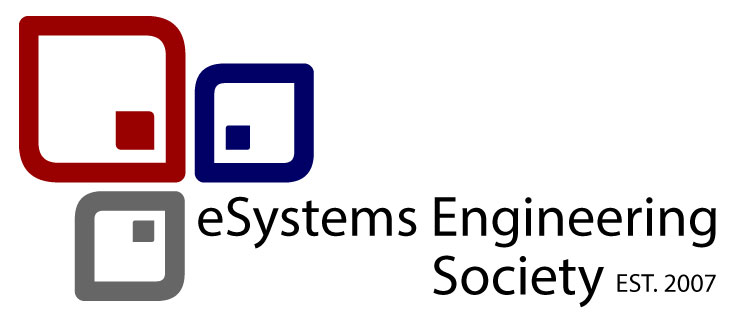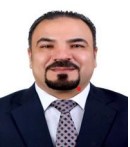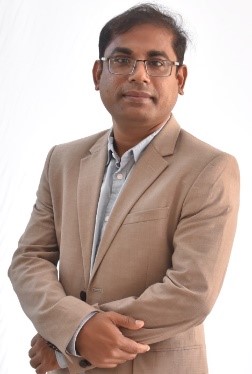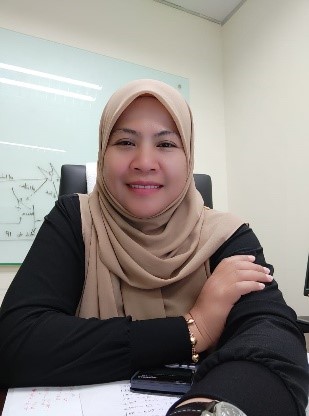———————————————————————————————————————–
AI Technical Advisory Board
———————————————————————————————————————–
Dr. Wasiq KHAN is a Senior Academic in Artificial Intelligence & Data Sciences within the Department of Computer Science at Liverpool John Moores University, UK. He is also serving as a Visiting Professor of Artificial Intelligence (University of Anbar, Iraq). Wasiq received his B.Sc. in Mathematics, Physics, and Geography following an M.Sc. in Computer Science from Pakistan. At Bradford University UK, He received an M.Sc. in Artificial Intelligence for Board Games following by a Ph.D. in Speech Analysis & Intelligent Reasoning and a Post Graduate Certificate in Teaching & Learning in Higher Education (PGCHEP).
Wasiq has been leading several large-scale research projects as Senior Research Scientist in collaborations with Academic Institutions and Industry across the globe. He is research active within the domain of Artificial Intelligence, Deep/Machine Learning, Data Science, Speech and Video/Image data analysis. Currently, Wasiq is leading on several ongoing research projects mostly covering Applied AI and Data science in diverse domains including: Defence and Security systems (e.g., suspect identification, deep behaviour analysis), Deep facial analysis (e.g., deception detection, mental health), Aerospace (e.g., domestic drones/UAVs, cockpit monitoring), & Smart city applications (e.g., deep vision), and Healthcare technologies (e.g., blind mobility aid, HCI in autism).
Wasiq has been publishing the research outcomes in high impact Journals, peer reviewed conferences, News blogs & Media, Scientific festivals and public events. He is an active reviewer for top ranked Journals (e.g., Transactions) and government funding bodies including EPSRC, STFC, UKRI and NIHR. Along with his research activities, Wasiq is fully involved in teaching, administrative roles and Ph.D supervisions. Wasiq has established academic citizenship within his research domain along with his Fellowship of Higher Education Academy, UK.
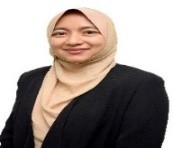 Prof. Ir. Dr. ADUWATI SALI (Senior Member, IEEE) received the B.Eng. degree in electrical electronics engineering (communications) from the University of Edinburgh, U.K., in 1999, the M.Sc. degree in communications and network engineering from Universiti Putra Malaysia (UPM), Malaysia, in April 2002, and the Ph.D. degree in mobile and satellite communications from the University of Surrey, U.K., in July 2009. She worked as an Assistant Manager with Telekom Malaysia Bhd, from 1999 to 2000. Prof. Aduwati was the Deputy Director at the UPM Research Management Centre (RMC), responsible for research planning and knowledge management, from 2016 to 2019. She has been a professor at the Department of Computer and Communication Systems, Faculty of Engineering, UPM, since February 2019. In 2020, Prof. Aduwati was a visiting scientist at the KIOS Research and Innovation Centre of Excellence, University of Cyprus, under the EU Horizon 2020-RISE Project. Prof Aduwati was involved with EU-IST Satellite Network of Excellence (SatNEx) I and II, from 2004 to 2009. She is the principal investigator and a collaborator for projects under local and international funding bodies, namely the Malaysian Ministry of Science, Technology, and Innovation (MOSTI), the Malaysian Ministry of Higher Education (MoHE), the Malaysian Communications and Multimedia Commission (MCMC), the Research University Grant Scheme (RUGS, now known as the Putra Initiative Grant) at UPM, the Academy of Sciences for the Developing World (TWAS-COMSTECH) Joint Grants, the EU Horizon 2020 Research and Innovation Staff Exchange (H2020-RISE), EU Erasmus+ Capacity Building for Higher Education (CBHE), and NICT Japan-ASEAN IVO, Prof. Aduwati gave consultations to the Malaysian Ministry of Information and Multimedia, the Malaysian Ministry of Higher Education, the National Space Agency (ANGKASA), ATSB Bhd., and Petronas Bhd. on projects related to mobile and satellite communications. Prof. Aduwati research interests include 5G and beyond, radio resource management, MAC layer protocols, satellite communications, satellite-assisted emergency communications, IoT systems for environmental monitoring, and 3-D video transmission over wireless networks. In 2014, the fateful event of missing MH370 prompted requests for her to be in printed and broadcast media, specifically Astro Awani, RTM, TV Al-Hijrah, BERNAMA, CityPlus FM, Harian Metro, and Metro Ahad, regarding analysis of satellite communication in tracking the aircraft. Prof. Aduwati has been an honorary member of the Young Scientists Network Academy of Sciences Malaysia (YSN-ASM) since 2020 and the co-chair and the chair for Science Policy, in 2017 and 2018, respectively. Prof Aduwati, is involved with IEEE as the Chair to ComSoc/VTS Malaysia (2017 and 2018) and Young Professionals (YP), in 2015. She was a recipient of the 2018 Top Research Scientists Malaysia (TRSM) Award from the Academy of Sciences Malaysia (ASM), a Finalist of Study U.K. Alumni Award 2020–2021 Professional Achievement Award, and the National Finalist at the Seventh Annual Underwriters Laboratories-ASEAN-U.S. Science Prize for Women 2021. Prof Aduwati, is also a Chartered Engineer (C.Eng.) registered under the U.K. Engineering Council and a Professional Engineer (P.Eng.) under the Board of Engineers Malaysia (BEM).
Prof. Ir. Dr. ADUWATI SALI (Senior Member, IEEE) received the B.Eng. degree in electrical electronics engineering (communications) from the University of Edinburgh, U.K., in 1999, the M.Sc. degree in communications and network engineering from Universiti Putra Malaysia (UPM), Malaysia, in April 2002, and the Ph.D. degree in mobile and satellite communications from the University of Surrey, U.K., in July 2009. She worked as an Assistant Manager with Telekom Malaysia Bhd, from 1999 to 2000. Prof. Aduwati was the Deputy Director at the UPM Research Management Centre (RMC), responsible for research planning and knowledge management, from 2016 to 2019. She has been a professor at the Department of Computer and Communication Systems, Faculty of Engineering, UPM, since February 2019. In 2020, Prof. Aduwati was a visiting scientist at the KIOS Research and Innovation Centre of Excellence, University of Cyprus, under the EU Horizon 2020-RISE Project. Prof Aduwati was involved with EU-IST Satellite Network of Excellence (SatNEx) I and II, from 2004 to 2009. She is the principal investigator and a collaborator for projects under local and international funding bodies, namely the Malaysian Ministry of Science, Technology, and Innovation (MOSTI), the Malaysian Ministry of Higher Education (MoHE), the Malaysian Communications and Multimedia Commission (MCMC), the Research University Grant Scheme (RUGS, now known as the Putra Initiative Grant) at UPM, the Academy of Sciences for the Developing World (TWAS-COMSTECH) Joint Grants, the EU Horizon 2020 Research and Innovation Staff Exchange (H2020-RISE), EU Erasmus+ Capacity Building for Higher Education (CBHE), and NICT Japan-ASEAN IVO, Prof. Aduwati gave consultations to the Malaysian Ministry of Information and Multimedia, the Malaysian Ministry of Higher Education, the National Space Agency (ANGKASA), ATSB Bhd., and Petronas Bhd. on projects related to mobile and satellite communications. Prof. Aduwati research interests include 5G and beyond, radio resource management, MAC layer protocols, satellite communications, satellite-assisted emergency communications, IoT systems for environmental monitoring, and 3-D video transmission over wireless networks. In 2014, the fateful event of missing MH370 prompted requests for her to be in printed and broadcast media, specifically Astro Awani, RTM, TV Al-Hijrah, BERNAMA, CityPlus FM, Harian Metro, and Metro Ahad, regarding analysis of satellite communication in tracking the aircraft. Prof. Aduwati has been an honorary member of the Young Scientists Network Academy of Sciences Malaysia (YSN-ASM) since 2020 and the co-chair and the chair for Science Policy, in 2017 and 2018, respectively. Prof Aduwati, is involved with IEEE as the Chair to ComSoc/VTS Malaysia (2017 and 2018) and Young Professionals (YP), in 2015. She was a recipient of the 2018 Top Research Scientists Malaysia (TRSM) Award from the Academy of Sciences Malaysia (ASM), a Finalist of Study U.K. Alumni Award 2020–2021 Professional Achievement Award, and the National Finalist at the Seventh Annual Underwriters Laboratories-ASEAN-U.S. Science Prize for Women 2021. Prof Aduwati, is also a Chartered Engineer (C.Eng.) registered under the U.K. Engineering Council and a Professional Engineer (P.Eng.) under the Board of Engineers Malaysia (BEM).
Prof. AHMAD N. ABDALLA graduated with a bachelor’s degree from the University of Technology in Baghdad in 1997 and a master’s degree in 2002. In 2007, he earned a PhD from China’s Huazhong University of Science and Technology in Wuhan. Prior to this, he served as dean of the University of Technology in Iraq’s Workshop and Training Center. In my current role as a professor at Huaiyin University of Technology in Huai’an, China. Prof. Ahmad has written or co-written a large number of articles that have been published in high-impact journals that are indexed by SCI, EI, and Scopus. Prof. Ahmad’s study has been featured in exhibitions and garnered him widespread acclaim throughout the globe. System modeling, parameter identification, sensor design, and the use of intelligent methodologies are all areas in which he excels. Prof. Ahmad has spoken on such topics as speech signal processing, digital electronics, and radio frequency identification. technology for communicating in an industrial setting. Multiple books, the ISI and Scopus databases, and the Guide to Implementing Electronic Systems in Organizations Practical Knowledge Management: Tools and Techniques for Improving Organizational Performance was published in 2010. 2011. Book. Prof. Ahmad , awarded a several medial from several countries: The National Research Council of Thailand awarded the 2015 Thailand Inventors’ Competition gold. A silver medal from the IPNF Forum in Thailand and the International Intellectual Property Network Exhibition Archimedes 2011, Islamic Republic of Iran, Silver Medal, Certificate of Merit, and Best of Show Award, the Islamic Republic of Iran won the gold medal at the 10th Malaysia Technology Expo (MTE) in 2011. 2009’s “Multi-Patient DSP-Based Arrhythmias Monitoring System Using a Reliable Wireless Sensor Protocol” won a silver medal at the 37th International Exhibition of Inventions, New Techniques, and Products in Geneva, Switzerland. Seoul, Korea’s International Intervention Fair in 2009 earned the bronze medal. Also, an award for bronze was given at the 2009 International Inventors’, Innovators’, and Technologists’ Exhibition (ITEX).
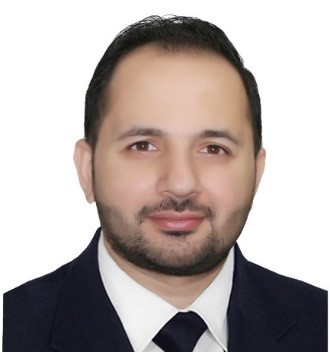 Ali M. Al-Saegh received his B.Sc. degree in Electronic and Communications (2005), and M.Sc. degree in satellite engineering (2008) from electronic and communications engineering department in Nahrain University, Baghdad, Iraq. He received his Ph.D degree in wireless communications engineering from computer and communication system engineering department in Universiti Putra Malaysia (UPM), Selangor, Malaysia, in 2015. From 2009 to 2012, he was attached as a lecturer in computer engineering techniques and communications engineering departments in Al-Ma’moon university college, Iraq. From 2013 to 2014 he was a research assistant in the department of computer and communication systems engineering, UPM, Malaysia. From 2015 to 2021 he has been a senior lecturer in Computer Engineering Techniques department in Al-Ma’moon university college, Iraq, and since 2021 he has been an Associate professor in the same department. His areas of specialization are Radiowaves propagation, satellite communications, atmospheric impairments prediction, channel modeling, mitigation techniques, SLM communications, and resource management.
Ali M. Al-Saegh received his B.Sc. degree in Electronic and Communications (2005), and M.Sc. degree in satellite engineering (2008) from electronic and communications engineering department in Nahrain University, Baghdad, Iraq. He received his Ph.D degree in wireless communications engineering from computer and communication system engineering department in Universiti Putra Malaysia (UPM), Selangor, Malaysia, in 2015. From 2009 to 2012, he was attached as a lecturer in computer engineering techniques and communications engineering departments in Al-Ma’moon university college, Iraq. From 2013 to 2014 he was a research assistant in the department of computer and communication systems engineering, UPM, Malaysia. From 2015 to 2021 he has been a senior lecturer in Computer Engineering Techniques department in Al-Ma’moon university college, Iraq, and since 2021 he has been an Associate professor in the same department. His areas of specialization are Radiowaves propagation, satellite communications, atmospheric impairments prediction, channel modeling, mitigation techniques, SLM communications, and resource management.
Dr. Falah Hamode received my Master (2009) and PhD (2013) degree in Artificial Intelligence from University Technology Malaysia (UTM). I used to be a Presenter for Postgraduate Annual Research Seminar (2010-2012), and President of International Student Society (2011-2013) at University Technology Malaysia.
From 2014 to 2021, Dr.Falah was a senior Lecturer at the Faculty of Information Sciences and Engineering (FISE), Management and Science University (MSU), Malaysia. Moreover, Dr.Falah is an assistant Professor in the faculty of computing and Information technology at Sohar University Oman. His research interests
are broad ranging with a particular focus on:
I. Improve neural network algorithms and classification data.
II. Spiking neural network for classification dataset and machine learning.
III. Big data analytics and GPU-based computing courses.
Dr. Falah has published high-quality research articles in international journals and conferences. He has acted as an expert Editor and Member for the International Journal of Advances in Soft Computing & Its Applications (IJASCA). He has also supervised 70 bachelor students for their final year projects and currently works with a talented team of postgraduate students in deferent international universities. He taught many core-subjects at the faculty, including: Artificial Intelligence, Advanced Research Methodology, Data Structure Algorithm, Digital Investigation, and Database System Developing at undergraduate and postgraduate level. Currently research coordinator in Computing & Faculty of
Computing & IT, Sohar University, Oman from 2021- present.
Ts Dr. Mohammad Kamrul Hasan is currently working as a senior lecturer in the Network and Communication Technology research cluster at the Center for Cyber Security at Universiti Kebangsaan Malaysia (UKM). He completed a Doctor of Philosophy (Ph.D.) degree in Electrical and Communication Engineering from the Faculty of Engineering, International Islamic University, Malaysia, in 2016. He is specialized in elements pertaining to cutting-edge information-centric networks: vehicular networks, wireless communication and networking, cyber-physical systems, smart grid WAM systems, industrial IoT, and electric vehicles. He has published more than 150 indexed papers in ranked journals and conference proceedings. Dr. Kamrul is a senior member of the Institute of Electrical and Electronics Engineers, a member of the Institution of Engineering and Technology, and a member of the Internet Society. Dr. Kamrul is a certified professional technologist (P.Tech. / Ts.) at the Board of Technology Malaysia. He served the IEEE student branch as president/chapter chair from 2014 to 2016. He has actively participated in many events/workshops/trainings for the IEEE and IEEE humanitarian programs in Malaysia. He is working for IEEE, Elsevier, IET, MDPI, and Frontiers as an associate editor and guest editor.
Dr. Fazdliana Samat received her Bachelor’s Degree from Multimedia University (MMU), Cyberjaya, Selangor Malaysia, in Electronics, Majoring in Computer Engineering, in 2000. After graduating, she was attached as a temporary replacement for the Assistant General Manager (AGM) position in Telekom Research & Development Sdn. Bhd. (TMR&D) with one of the tasks was a technical editor for the Telekom Journal before continuing as a Researcher in the Multimedia communication Unit lab. She was involved in various projects: Image Processing and RTSP/RTP Real Time Streaming. She was also in the TMR&D Library System development team and the company’s internal Trainer in MATLAB (Basic and Advanced). In 2006, she worked as a Technical Executive in the Marketing and Business Development Department of TMR&D and managed the research works to affiliate with the company’s client. From 2007 to 2014, she experienced in marketing and business operations as a manager to a group of entrepreneurs before continuing her study for a Master of Engineering in Computer and Communications at Universiti Kebangsaan Malaysia (UKM), Bangi, Selangor, Malaysia and graduating in 2018. She furthers her Doctorate of Philosophy (PhD) in Electronics and Electrical Engineering, focusing on satellite signal propagation and impairment and graduated in January 2022. She is currently a postdoctoral researcher at the Space Science Center, Institute of Climate Change, Universiti Kebangsaan Malaysia (UKM) since June 2022. Her research interest is signal fade mitigation techniques, multi-site diversity and satellite broadcasting services.
Medical Advisory Board
 Dr Salwa Yasin is worked as a GP based in Southport, UK for 17 years, with an interest in family planning and dementia. In 2005, I achieved my diploma in Obstetrics & Gynaecology (DRCOG) and Family Planning (DFFP). In my spare time I volunteer as an examiner for OSCEs and an admissions interviewer for Liverpool Medical School. I am also involved in multiple areas of research at John Moores University, looking at the use of smart devices in dementia, and the psychological impact of Covid-19. I am a mother of 3 and have recently become a grandmother to a beautiful little boy. My hobbies include spending time with my family, going to the gym, or going travelling.
Dr Salwa Yasin is worked as a GP based in Southport, UK for 17 years, with an interest in family planning and dementia. In 2005, I achieved my diploma in Obstetrics & Gynaecology (DRCOG) and Family Planning (DFFP). In my spare time I volunteer as an examiner for OSCEs and an admissions interviewer for Liverpool Medical School. I am also involved in multiple areas of research at John Moores University, looking at the use of smart devices in dementia, and the psychological impact of Covid-19. I am a mother of 3 and have recently become a grandmother to a beautiful little boy. My hobbies include spending time with my family, going to the gym, or going travelling.

